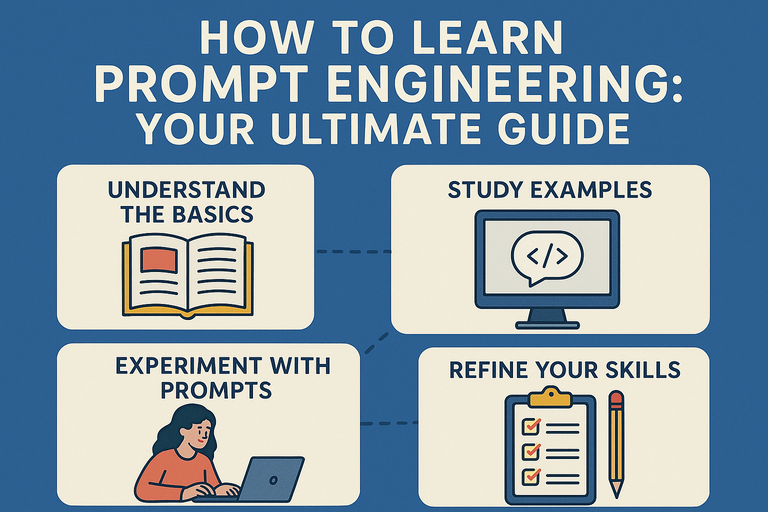How to Learn Prompt Engineering: Your Ultimate Guide
Estimated reading time: 8 minutes
Key Takeaways
- Prompt engineering bridges human intent and AI output with precise prompts.
- Essential skills include NLP understanding, context management, and iterative refinement.
- Multiple learning paths—self-study, courses, bootcamps, certifications—suit different needs.
- Hyperfocused practice and community engagement accelerate mastery.
If you’re looking to learn prompt engineering, you’re stepping into a skill that will define the future of human-AI interaction. Prompt engineering is the process of designing and refining prompts—questions or instructions—to elicit specific, high-quality responses from AI models. This crucial skill serves as the interface between human intent and machine output. The way you phrase prompts directly affects outputs from ChatGPT, DALL-E, and other AI systems.
What is Prompt Engineering?
At its core, prompt engineering is structuring or crafting instructions to guide generative AI systems toward specific outputs. Like teaching through well-phrased questions—just as a child yields better answers when asked clearly, AI produces better results when prompted precisely.
The quality of your prompt directly determines the quality of AI output, making mastery of this skill invaluable in today’s technology landscape.
Key Components of Prompt Engineering
- Technical knowledge: Understanding model architectures (e.g., transformer models) and token limits.
- Natural language understanding: Selecting precise vocabulary, syntax, and semantics to communicate intent.
- Iterative refinement: Testing prompts, analyzing AI responses, and iteratively tweaking phrasing.
- Model-specific considerations: Adjusting for GPT-4 vs. Google Bard differences (context window, temperature settings) via optimize prompts guide.
For more on these foundations, visit IBM’s overview of prompt engineering.
Essential Prompt Engineering Skills
- Natural Language Processing understanding
- Familiarity with tokenization, embeddings, and context windows (e.g., GPT-4’s 8,192-token limit).
- Understanding how AI models process and interpret language.
- Context Management
- Providing relevant background, constraints, and examples.
- Balancing detail with clarity.
- Iterative Refinement
- Conducting A/B tests of prompts.
- Documenting changes and outcomes in a prompt journal.
- Model-Specific Knowledge
- Leveraging settings such as temperature and top-p.
- Understanding each model’s unique capabilities and limitations.
- Technical Writing
- Writing clear, concise, and unambiguous instructions.
- Avoiding jargon that may confuse AI.
Explore a detailed primer at Coursera’s article on prompt engineering.
Why You Should Learn Prompt Engineering
- Career Opportunities: Roles like Prompt Engineer and Generative AI Specialist are emerging as companies adopt AI.
- Productivity Enhancement: Optimized prompts reduce manual editing by producing higher-quality first drafts.
- Competitive Advantage: Stand out in the AI-driven job market with specialized skills.
- Versatility: Apply prompt engineering across marketing, software development, design, data analysis, and more.
Learn more at IBM’s resource on prompt engineering.
Learning Prompt Engineering: Available Pathways
Self-Study
- Access free resources like DataCamp blog, Coursera articles, and AWS documentation.
- Practice regularly using OpenAI Playground.
- Keep a prompt engineering journal to track progress.
Online Courses
- Structured curriculum with lectures, readings, and assignments.
- Regular assessments to measure progress.
- Flexible scheduling for self-paced learning via this course.
Prompt Engineering Bootcamps
- Intensive, cohort-based training (4-12 weeks).
- Live instruction and immediate feedback.
- Hands-on projects with real-world applications via mastering ChatGPT API automation.
Certification Programs
- Formal validation of skills.
- Industry-recognized credentials.
- Structured learning path with clear milestones.
Community Engagement
- Active participation in forums (Reddit, Discord).
- Contribution to GitHub repositories.
- Regular peer feedback and collaboration.
Prompt Engineering Courses
- Comprehensive curriculum covering both theory and practice.
- Minimum of 3 practical projects.
- Updated content (within last 6 months).
- Experienced instructors with AI/NLP background.
Example: Coursera’s Prompt Engineering Specialization by Vanderbilt University (4 weeks, capstone project).
Prompt Engineering Bootcamps
- 6-12 week immersive cohorts.
- Daily live sessions.
- Hands-on projects (e.g., building conversational chatbots).
- Mentor support and peer code reviews.
- Career services and job placement assistance.
Selection Tips:
- Verify job placement rates.
- Review alumni success stories.
- Check curriculum alignment with current AI models.
Prompt Engineering Certification
- Third-party validation of skills.
- Increased visibility to recruiters.
- Professional credibility.
Common certification paths include Coursera specialization, IBM AI Foundations, and upcoming vendor-specific credentials.
Choosing the Right Learning Path for You
Time Investment:
- Bootcamp: Intensive, weeks-long commitment.
- Course: Several months of part-time study.
- Self-study: Flexible, self-paced learning.
Budget Considerations:
- Free: Self-study with online resources.
- Low-cost: Online courses and certifications.
- Premium: Bootcamps and intensive programs.
Support Level:
- Self-guided: Independent learning.
- Instructor-led: Structured guidance.
- Cohort-based: Peer support and collaboration.
Additional Resources for Learning Prompt Engineering
- Online Communities: Reddit r/PromptEngineering, AI & Prompt Engineers Discord servers.
- Practice Platforms: OpenAI Playground, Hugging Face Inference API.
- Industry Blogs: DataCamp blog, IBM Think blog.
- Open-Source Projects: GitHub prompt-engineering repositories.
- Model Documentation: OpenAI API docs, DALL-E guides, Midjourney documentation.
Conclusion
Mastering prompt engineering unlocks AI’s full potential, boosting both productivity and career prospects. Whether you choose self-study, courses, bootcamps, or certification programs, the key is to start practicing and refining your skills today.
FAQ
Prompt engineering is the practice of crafting effective prompts—clear questions or instructions—to guide AI models toward desired outputs.
The timeline varies: self-study can take weeks to months, while bootcamps last 4-12 weeks. Consistent practice accelerates learning.
Basic familiarity with APIs and JSON is helpful, but strong writing and critical thinking skills are more important initially.
Start with free tutorials on OpenAI Playground, read articles like the Coursera guide, and join prompt engineering communities on Reddit or Discord.
